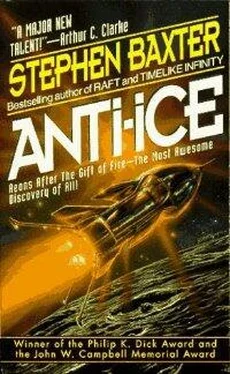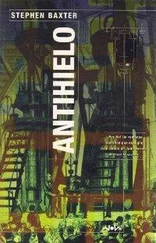Five minutes later we came upon the balloon. The craft, deflated now, was constructed of crudely- sewn oddments of cloth—I spotted tablecloths, bedsheets, curtains, and even a soft, white fabric which reminded me of the gentler items of ladies’ apparel. The sac was breached by panels attached to lengths of twine; these panels were clearly intended to be ripped open in order to deflate the sac; but around these neat rectangles the balloon wall had torn, and so the craft must have descended with more velocity than the pilot intended. I remarked to Traveller, “Good Lord, Sir Josiah, this whole affair is nothing more than an improvisation.”
Traveller said, “One would need more courage to take to the air in such a vessel than to travel to the Moon in the Phaeton. The inhabitants of Paris must be truly desperate to—”
“Actually,” came a voice, in French, from behind billows of cloth, “this Parisian is only desperate to get on with his business without the accompaniment of arrogant English remarks, and—ow!”
Traveller and I exchanged startled glances; and we hurried around the fallen balloon.
The craft’s basket was nothing more than a large wicker laundry box, fixed to the sac by lengths of leather. The basket lay on its side, and scrolls and bundles had spilled over the soft soil; and in the midst of all this debris sat a young man. He was about my height and age, with dark, Gallic good looks. He was dressed in the plain, dour clothes of the city worker; so that he could have been, for example, a bank clerk. But his gray jacket was torn and muddied. His left leg was stretched out before him, and he was pushing at the ground, trying to rise to his feet; but every time he put an ounce of weight on that left leg he winced in pain.
Traveller bent to examine the damaged leg. I said, in English, “You must rest there. Your leg has clearly been hurt, and—”
In French he replied, “My name is Charles Nandron. I am a deputy in the Government of National Defense. Sir, you are on the soil of France, no doubt uninvited; you will have the courtesy to address me in the tongue of my country, or not at all—ow!” Traveller’s probing fingers had reached his ankle. Nandron threw back his head and clenched his teeth.
Using my fluent French I introduced myself and Traveller. “We came here in the Phaeton, which is an anti-ice—”
“I have no interest in English gadgets,” sniffed the deputy. “I have risked my life in order to communicate with our provincial government in Tours—”
In his snapping English, Traveller said, “If you don’t sit still and show some interest in this leg, young man, you won’t be communicating with anybody except a few grape-growers for a long while.” He turned to me and said, “I’m no doctor, but I don’t think there’s a break—just laid-open skin and a nasty sprain. In the Phaeton I have some linament and poultices; if you keep our haughty young gentleman from crawling away I will fetch the medication.”
I nodded briefly. As Traveller stalked off Nandron’s arrogant eyes flickered curiously at Sir Josiah’s platinum nose; but he soon returned to his inspection of the sky.
I said in French, “The accounts in Manchester of the state of Paris are fragmentary, based largely on the news brought out by intrepid escapers like yourself—leavened with a healthy dose of speculation.”
He nodded, closing his eyes. “Paris is in grave peril. The Prussians clearly intend to starve her into submission.”
“You receive news of the war in there?”
“We know that Bismarck holds all of France to the north and east of Orléans, save Paris alone. Just as in 1815, France will stand or fall as Paris stands or falls; but this time we will repel the invaders…”
“Yes. And is there an army inside the walls of the city?”
“An army of citizens, sir. The National Guard has been doubled to over three hundred thousand men; every able-bodied man in the city, practically, has risen to save his country. Even we politicians are expected to serve in the breach!”
I studied his proud face, plastered now with the perspiration of pain, and reflected that if the history of the hydra-like Parisian mob was any guide, these hapless politicians probably had little choice but to man the barricades with the rest. But I forbore to comment on this, asking instead: “And what is the situation in the city?”
He shook his head. “You know that food cannot be brought into the city; the prevailing winds make it impossible to fly in even a few pounds by balloon. But there is much food remaining; our difficulty as a government has been one of distribution, both by region and through society.” He laughed with a mild cynicism. “It surprises no one that the poor suffer most. Shopkeepers too are seeing their businesses ruined. But the best restaurants maintain full menus.” He fixed me with a glare and tried to sit up straighter. “Perhaps you and your dilettante companion would care to call on one such during your visit. I apologize in the name of all Parisians for the lack of such items as fresh vegetables and seafood; but the menus have been made more exotic than ever with the addition of such items as kangaroo, elephant and cat—”
I laid a calming hand on his shoulder. “Sir, we are not your enemies. We are risking our own lives in this theater of war; we are searching for someone.”
With a stab of curiosity he demanded, “Who?”
“Have you heard of the Prince Albert? ” I explained the circumstances of the craft’s stealing by franc-tireurs, and the accounts of its moving south toward Paris.
But Nandron shook his head. “I know nothing of such a vessel,” he said dismissively. “And in any event our franc-tireurs are now much more profitably employed on the disruption of the Prussians’ long supply lines back to Berlin…”
Disappointed by this fresh failure, I nevertheless spent the remaining minutes waiting for Traveller’s return drawing further details from this haughty young Parisian of the condition of his city. He told me, for example, how even now the program to rebuild the thirty-year-old defensive walls was beset by wrangling and delays as rival groups of engineers argued over the selection of the most elegant and appealing design. I could not help but recall my brother’s accounts of the simple but efficient earthwork fortifications thrown up by the Russians around Sebastopol.
In the calm, fading light of that rustic French afternoon I found it difficult to accept as truth the harrowing details of Nandron’s tales.
Paris’s best hope of salvation seemed to lie with the Minister of the Interior, Gambetta, who some weeks earlier had ballooned out of Paris. This Gambetta had, it seemed, raised a new army from the very earth of France itself, and had already struck at the Prussians with some success, at Coulmiers, close to Orléans. Now Gambetta was making for Orléans where he intended to make a fresh stand against the invaders. But vast Prussian forces, formerly kept busy by the siege at Metz, were moving to meet him; and it appeared that Orléans might become as decisive a battlefield as Sedan.
Traveller returned and efficiently applied a poultice to Nandron’s leg. As Sir Josiah worked Nandron went on, “It is said that General Trochu”—the head of the provisional government—“has no fears for the future of France; for he believes that Sainte Geneviиve, who delivered the country from barbarians in the fifth century, will return to do so again.” He laughed with some bitterness.
I asked, “You do not share his beliefs?”
“I would rather have truck with the rumors flying around the bars of the city which state that Bonaparte himself has returned from the dead—or perhaps did not ever die at all, in his place of British exile—and is returning in a great chariot to join Gambetta’s armies at Orléans and drive out the Prussians.”
Читать дальше












